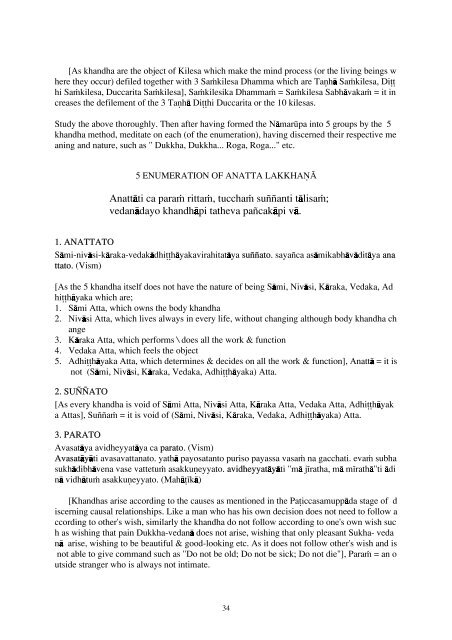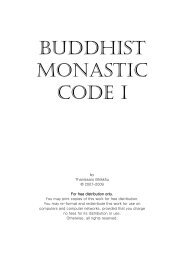Vipassana Kammatthana.pdf
Vipassana Kammatthana.pdf
Vipassana Kammatthana.pdf
You also want an ePaper? Increase the reach of your titles
YUMPU automatically turns print PDFs into web optimized ePapers that Google loves.
[As khandha are the object of Kilesa which make the mind process (or the living beings w<br />
here they occur) defiled together with 3 Sa◊kilesa Dhamma which are Taˆhå Sa◊kilesa, Di<br />
hi Sa◊kilesa, Duccarita Sa◊kilesa], Sa◊kilesika Dhamma◊ = Sa◊kilesa Sabhåvaka◊ = it in<br />
creases the defilement of the 3 Taˆhå Di hi Duccarita or the 10 kilesas.<br />
Study the above thoroughly. Then after having formed the NåmarËpa into 5 groups by the 5<br />
khandha method, meditate on each (of the enumeration), having discerned their respective me<br />
aning and nature, such as " Dukkha, Dukkha... Roga, Roga..." etc.<br />
5 ENUMERATION OF ANATTA LAKKHAÔÓ<br />
Anattåti ca para◊ ritta◊, tuccha◊ suññanti tålisa◊;<br />
vedanådayo khandhåpi tatheva pañcakåpi vå.<br />
1. ANATTATO<br />
Såmi-nivåsi-kåraka-vedakådhi håyakavirahitatåya suññato. sayañca asåmikabhåvåditåya ana<br />
ttato. (Vism)<br />
[As the 5 khandha itself does not have the nature of being Såmi, Nivåsi, Kåraka, Vedaka, Ad<br />
hi håyaka which are;<br />
1. Såmi Atta, which owns the body khandha<br />
2. Nivåsi Atta, which lives always in every life, without changing although body khandha ch<br />
ange<br />
3. Kåraka Atta, which performs \ does all the work & function<br />
4. Vedaka Atta, which feels the object<br />
5. Adhi håyaka Atta, which determines & decides on all the work & function], Anattå = it is<br />
not (Såmi, Nivåsi, Kåraka, Vedaka, Adhi håyaka) Atta.<br />
2. SUÑÑATO<br />
[As every khandha is void of Såmi Atta, Nivåsi Atta, Kåraka Atta, Vedaka Atta, Adhi håyak<br />
a Attas], Suñña◊ = it is void of (Såmi, Nivåsi, Kåraka, Vedaka, Adhi håyaka) Atta.<br />
3. PARATO<br />
Avasatåya avidheyyatåya ca parato. (Vism)<br />
Avasatåyåti avasavattanato. yathå payosatanto puriso payassa vasa◊ na gacchati. eva◊ subha<br />
sukhådibhåvena vase vattetu◊ asakkuˆeyyato. avidheyyatåyåti "må j¥ratha, må m¥rathå"ti ådi<br />
nå vidhåtu◊ asakkuˆeyyato. (Mahå ¥kå)<br />
[Khandhas arise according to the causes as mentioned in the Pa iccasamuppåda stage of d<br />
iscerning causal relationships. Like a man who has his own decision does not need to follow a<br />
ccording to other's wish, similarly the khandha do not follow according to one's own wish suc<br />
h as wishing that pain Dukkha-vedanå does not arise, wishing that only pleasant Sukha- veda<br />
nå arise, wishing to be beautiful & good-looking etc. As it does not follow other's wish and is<br />
not able to give command such as "Do not be old; Do not be sick; Do not die"], Para◊ = an o<br />
utside stranger who is always not intimate.<br />
34






